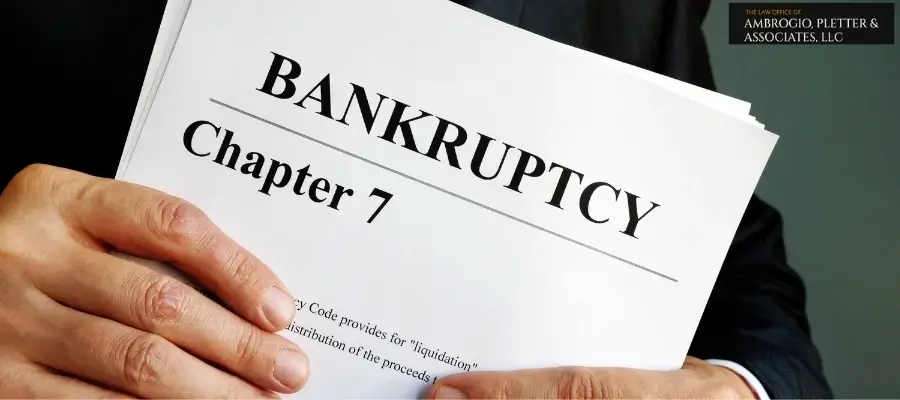Initiating a Chapter 7 bankruptcy case will not get rid of your foreclosure case if your lender has already begun the process. Chapter 7 will put an automatic stay on any actions your lender can take, as well as postpone the Law Day. Bankruptcy will release you from liability in paying back mortgage debt, but you may lose the home.
Can Chapter 7 Bankruptcy Stop Foreclosure in Connecticut?

Chapter 7 bankruptcy is a stressful time. There are plenty of questions that will come up that can become serious problems to consider. One pressing concern is whether you will keep the home you live in. Can Chapter 7 bankruptcy stop foreclosure in Connecticut? It’s an important question to know the answer to.
Why Choose Our Firm?
Attorney Tim Pletter and Ambrogio, Pletter & Associates, LLC have been helping the people of Connecticut for decades with their Chapter 7 bankruptcy cases. Tim has been listed as one of the Top Rated Lawyers in the New York area by New York Magazine and has been labeled one of Connecticut’s Super Lawyers. We will answer any questions you have. Our knowledge and experience from hundreds of litigated cases make us prepared to help.
Connecticut Chapter 7 Bankruptcy
Before considering how Chapter 7 bankruptcy will affect a foreclosure, it’s helpful to understand the process.
Chapter 7 is the most common bankruptcy case nationwide every year. In 2024, 310,631 Americans filed under Chapter 7. In Connecticut, you must make under the state median income for your household size to qualify for Chapter 7 bankruptcy. For instance, a one-person household wanting to petition a Chapter 7 case must make under $82,341 annually.
If you have a high income, you may still qualify if your allowed expenses leave you with very little disposable income.
Once you are established to be under the applicable income level and complete a creditor consultation, you may file your Chapter 7 bankruptcy case. You will submit a petition including all your debts, all assets, financial history, and any other additional information requested.
Automatic Stay
After you file under Chapter 7, an automatic stay will take effect. An automatic stay bars all creditors from taking any action against you while the bankruptcy is being processed. This freezes any attempts at claims against you, ends any wage garnishments, and halts any foreclosure or eviction attempts.
The timeline for the foreclosure stoppage is the same as your Chapter 7 bankruptcy case. A 2023 review by the national court system found that the average Chapter 7 bankruptcy case took 188 days to complete. So, your foreclosure would be paused during that time.
Law Day
When a foreclosure claim is made in Connecticut, a deadline is established, called Law Day. Law Day is the date when, if the debt remains unpaid, ownership of the property will automatically transfer back to the lender. Unlike in other states, there is no foreclosure sale or auction. An automatic stay will remove the Law Day, but the debt will remain. If you petition for Chapter 7 bankruptcy after Law Day, it will not affect the foreclosure.
Preventative Chapter 7 bankruptcy
Chapter 7 bankruptcy can be a good choice if you have mortgage debt and your lender has not yet filed a foreclosure claim. This Chapter will discharge your liability for the mortgage, but will not change the mortgage lien. This means that you will no longer be legally responsible for the debt, but your lender may still evict you and repossess the house. You have the option to reaffirm the mortgage, but this may only be a good decision if you can restart payments.
You may be worried that filing under Chapter 7 bankruptcy will make you lose your home even if your high debts are unrelated to the mortgage. Depending on the property value, your home could be exempt from the bankruptcy process.
Connecticut Homestead Laws make any real estate worth $250,000 or less exempt from liquidation by a trustee. Homestead laws will only save your home if you are up to date with mortgage payments and no foreclosure process has started.
FAQs
Hire a Chapter 7 Bankruptcy Lawyer
Dealing with foreclosure and Chapter 7 on your own is challenging. Gathering the right documents, looking into your options, and meeting deadlines weighs heavily on you when you are already struggling. Attorney Tim Pletter and the team at Ambrogio, Pletter & Associates, LLC, are ready to advise and find solutions to your economic problems. We will work hard to get you through this bankruptcy.
Meet with us for an initial consultation so we can learn your story, or visit our Stratford office—located on Main Street, a few blocks west of Longbrook Park.
Take Action Today & Begin Moving Forward
Attorney Tim Pletter works directly with his clients, and most of your contact will be directly with him. Please contact our Stratford, Connecticut, office today to arrange your free consultation


